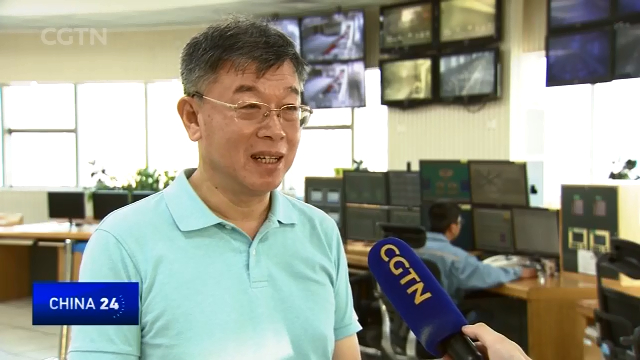
21:14, 11-Aug-2018
China-US Trade Frictions: Peak Pegasus will unload 70,000 tons of US soybeans in Dalian
Updated
20:35, 14-Aug-2018
03:48

For more about Peak Pegasus and its cargo, let's talk to our reporter Xu Xinchen in Dalian. Xinchen, can you tell us more about the ship?
Right there is where Peak Pegasus will unload 70-thousand tons of US soybeans. The vessel made headlines when it failed to beat a deadline for higher Chinese tariffs on July 6th — shortly after Trump imposed the first round of tariffs on 34 billion US dollars worth of Chinese goods. Docking today means the cargo is subject to the further 25 percent retaliatory tariff by China. The Guardian said the owner of the cargo wanted to wait and see if the trade tensions would ease or if he could find alternative buyers to avoid paying as much as 6 million US dollars in taxes. But that may not be entirely accurate. We asked the cargo owner, agricultural commodity trading house Louis Dreyfus and the Chinese purchaser Sinograin. And they said the ship didn't dock due to a limited warehouse capacity at the port. Due to the escalating trade tensions between the US and China, some firms have increased their orders for soybean imports causing a temporary congestion at the port — several vessels were waiting to offload. And China's Sinograin said it will pay off the tariffs. The Chinese firm also has to pay additional fees to keep the vessel in the water, but Sinograin said it is normal for the purchaser to cover that cost if docking was delayed.
A trade war hurts both sides, of course. By raising tariffs on US soybeans, American farmers suffer. But can China find enough soybean imports to meet its demand?
It most definitely hurts both sides. China's tariffs on US soybeans are causing prices to plunge in the US, devastating American farmers. China's vice minister of agriculture and rural affairs, Han Jun, says China has a 100-million ton demand to meet. Soybeans are crucial for the production of cooking oil and livestock feeds. He also said over 30 million tons of US soybeans were expected to arrive this year, but Chinese firms have halted their US orders after Beijing's 25 percent additional tariff. Sinograin says it has already found alternative soybean sources, so it has not yet seen a lag in production or price hikes.
CHEN XUECONG, DEPUTY GENERAL MANAGER SINOGRAIN OILS CORPORATION "There's definitely pressure, but we are confident that we can deal with the pressure. In the past few months, we've seen an escalation of the trade war, started by the U.S. To deal with that, we are actively adapting in terms of where we import soybeans from."
Now, Chinese firms are sourcing from countries like Brazil and Russia. I've spoken to a few traders, and they said while South American countries and countries around the Black Sea have the capacity to fill the demand, there are still logistical challenges. That's why prices have been slowly going up for Brazilian and Russian soybeans. Some analysts say China still needs to import a relatively small amount of US soybeans to meet its demand.

SITEMAP
Copyright © 2018 CGTN. Beijing ICP prepared NO.16065310-3
Copyright © 2018 CGTN. Beijing ICP prepared NO.16065310-3